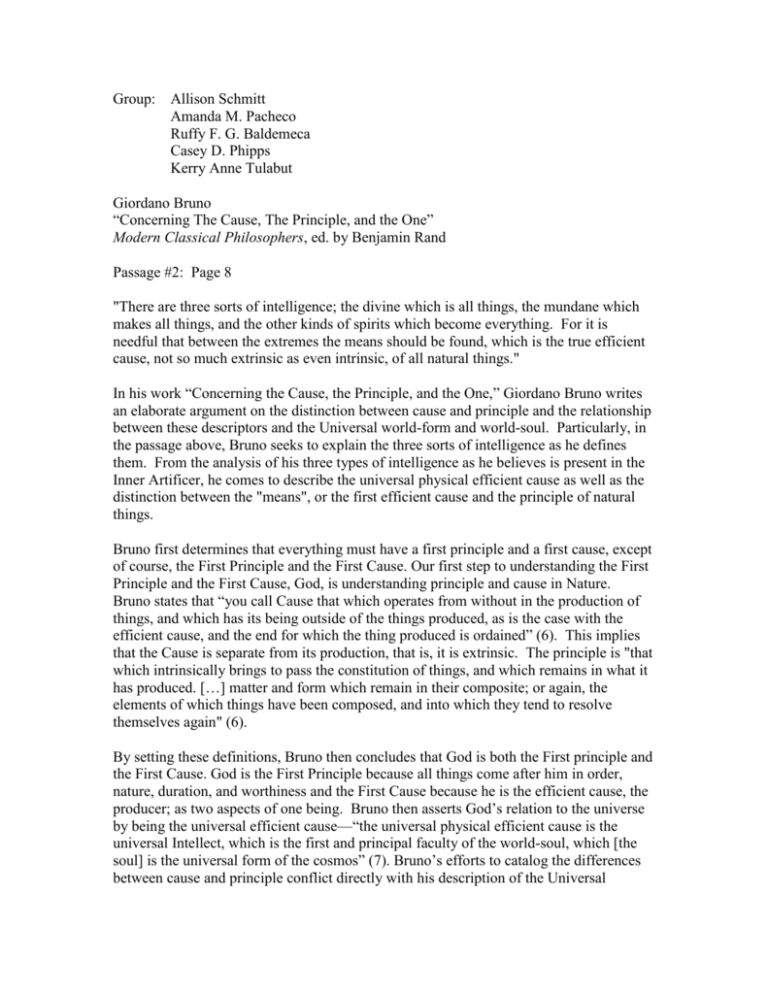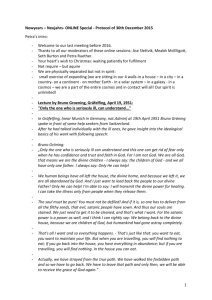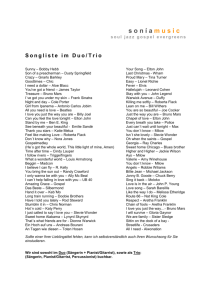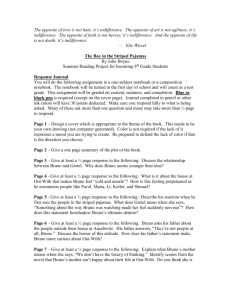Passage #2: “Of Cause, Principle, and the One” (8)
advertisement

Group: Allison Schmitt Amanda M. Pacheco Ruffy F. G. Baldemeca Casey D. Phipps Kerry Anne Tulabut Giordano Bruno “Concerning The Cause, The Principle, and the One” Modern Classical Philosophers, ed. by Benjamin Rand Passage #2: Page 8 "There are three sorts of intelligence; the divine which is all things, the mundane which makes all things, and the other kinds of spirits which become everything. For it is needful that between the extremes the means should be found, which is the true efficient cause, not so much extrinsic as even intrinsic, of all natural things." In his work “Concerning the Cause, the Principle, and the One,” Giordano Bruno writes an elaborate argument on the distinction between cause and principle and the relationship between these descriptors and the Universal world-form and world-soul. Particularly, in the passage above, Bruno seeks to explain the three sorts of intelligence as he defines them. From the analysis of his three types of intelligence as he believes is present in the Inner Artificer, he comes to describe the universal physical efficient cause as well as the distinction between the "means", or the first efficient cause and the principle of natural things. Bruno first determines that everything must have a first principle and a first cause, except of course, the First Principle and the First Cause. Our first step to understanding the First Principle and the First Cause, God, is understanding principle and cause in Nature. Bruno states that “you call Cause that which operates from without in the production of things, and which has its being outside of the things produced, as is the case with the efficient cause, and the end for which the thing produced is ordained” (6). This implies that the Cause is separate from its production, that is, it is extrinsic. The principle is "that which intrinsically brings to pass the constitution of things, and which remains in what it has produced. […] matter and form which remain in their composite; or again, the elements of which things have been composed, and into which they tend to resolve themselves again" (6). By setting these definitions, Bruno then concludes that God is both the First principle and the First Cause. God is the First Principle because all things come after him in order, nature, duration, and worthiness and the First Cause because he is the efficient cause, the producer; as two aspects of one being. Bruno then asserts God’s relation to the universe by being the universal efficient cause—“the universal physical efficient cause is the universal Intellect, which is the first and principal faculty of the world-soul, which [the soul] is the universal form of the cosmos” (7). Bruno’s efforts to catalog the differences between cause and principle conflict directly with his description of the Universal Intellect or Inner Artificer as the efficient cause. The definition given by Bruno for the Inner Artificer specifically states that the Inner Artificer forms and shapes material objects from within (8). By Bruno’s own definition, the Inner Artificer is a Principle and cannot be a Cause. However, since the Universal Intellect is assumed to be equivalent to the Divine intelligence described in the passage above, and thus God, it is possible for the Universal Intellect to be both a Principle and a Cause. In this sense, he believes God is the intermediary between extrinsic and intrinsic causes. God, as extrinsic cause, does not form a part of the things composed and the things produced and God, as intrinsic cause, does not operate around and outside of matter. The divine power of God that exists intrinsically must have a source of intention and this would be the Inner Artificer, or the efficient cause. God, before producing something, must have in this supreme intellect, an idea of that he wishes to create, and thus, must possess all forms of intelligence before creation: divine, mundane, and all other. All of the intelligences described above refer to particular faculties of God. The divine which is the “universal intellect,” is “the most intimate, real and essential faculty and effective part of the world-soul”. This intellect “fills the whole, illumines the universe and directs nature to produce the various species as is fitting, and has the same relation to the production of natural things as our intellect to the parallel production of our general ideas” (7). This intelligence, Bruno claims, is intrinsic of all natural things. He gives the example of a seed that is magnificently designed this intellect called the “inner artificer.” This inner artificer does not only operate in plants, it similarly operates in animals in that the “original seed” grows and works in the manner that was intended by the inner artificer. A parallel is then drawn from the way a sculptor or a carpenter puts together matter to form beautiful pieces of works that Bruno claims is just as creative as an Inner artificer. This example leads to Bruno’s claim that this divine intelligence “is all things” including the creative intelligence of a sculptor. In addition, he states that the greater artificer who is called God is greater in that he is not limited to a single medium to work with unlike a sculptor (8). The mundane intelligence which is also called the world builder “proceeds from the higher world to this world of sense.” As the name implies, the mundane intelligence is what makes everything in the material world. That the things in the material world is not all exquisite, so is mundane intelligence. As Bruno describes it, “This builder (they say) proceeds from the higher world (which is, in fact, one) to this world of sense, which is divided into many and in which not only harmony but also discord reigns, because it is sundered into parts. This intellect, infusing and extending something of its own into matter, restful and moveless in itself, produces all things” (7). Here, Bruno claims that the mundane intelligence is collectively one, however, it is divided into parts that produces all things. Among all things there are those that are put together beautifully which exhibits harmony and those that are not, which exhibit discord. Thus, between these three disparate ideas, some form of coherent understanding of God’s powers is sought by Bruno. By stating that “between the extremes the means should be found,” Bruno attempts to highlight the importance of understanding why the universe was created and functions in the way that it does. Since the Inner Artificer is responsible for the universe’s creation and function, he believes that pursuit of this knowledge will lend the investigator a great deal of insight into the First Efficient Cause of all natural things. Bruno makes it clear that there is in everything, natural intelligence and means that is the true efficient cause, similar to the efficient cause described by Aristotle. Bruno’s “true efficient cause,” however, is different in that it is not a singular thing but many, and even infinite which is in all things. By stating this, he brings forward the idea of an infinite efficient cause instead of a single efficient cause, which is God. Thus, there is a bit of god-like quality in everyone and everything.








